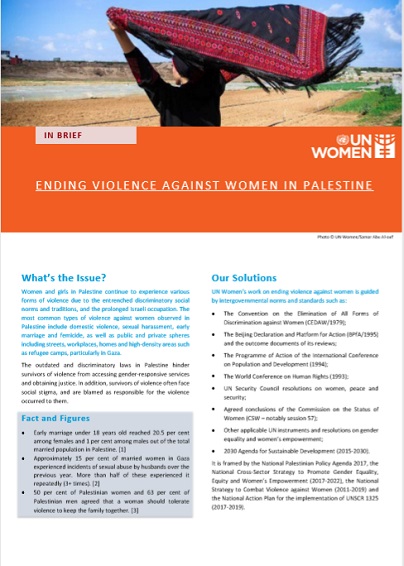
Ending Violence against Women in Palestine
Image

Women and girls in Palestine continue to experience various forms of violence due to the entrenched discriminatory social norms and traditions, and the prolonged Israeli occupation. The most common types of violence against women observed in Palestine include domestic violence, sexual harassment, early marriage and femicide, as well as public and private spheres including streets, workplaces, homes and high-density areas such as refugee camps, particularly in Gaza.
The outdated and discriminatory laws in Palestine hinder survivors of violence from accessing gender-responsive services and obtaining justice. In addition, survivors of violence often face social stigma, and are blamed as responsible for the violence occurred to them.
UN Women’s work on ending violence against women is guided by intergovernmental norms and standards such as:
The outdated and discriminatory laws in Palestine hinder survivors of violence from accessing gender-responsive services and obtaining justice. In addition, survivors of violence often face social stigma, and are blamed as responsible for the violence occurred to them.
UN Women’s work on ending violence against women is guided by intergovernmental norms and standards such as:
The Convention on the Elimination of All Forms of Discrimination against Women (CEDAW/1979);
The Beijing Declaration and Platform for Action (BPfA/1995) and the outcome documents of its reviews;
The Programme of Action of the International Conference on Population and Development (1994);
The World Conference on Human Rights (1993);
UN Security Council resolutions on women, peace and security;
Agreed conclusions of the Commission on the Status of Women (CSW – notably session 57);
Other applicable UN instruments and resolutions on gender equality and women’s empowerment;
2030 Agenda for Sustainable Development (2015-2030).
View online/download
Order printed/published version
Languages available in print
English; Arabic
Bibliographic information
Geographic coverage:
Arab States/North Africa
Palestine, State of
Subject areas:
Anti-violence interventions
Child marriage
Ending violence against women and girls
Harmful practices
Service delivery
Sexual harassment
Women’s rights
Resource type(s):
Briefs
UN Women office publishing:
Palestine Country Office
Publication year
2019
Number of pages
2